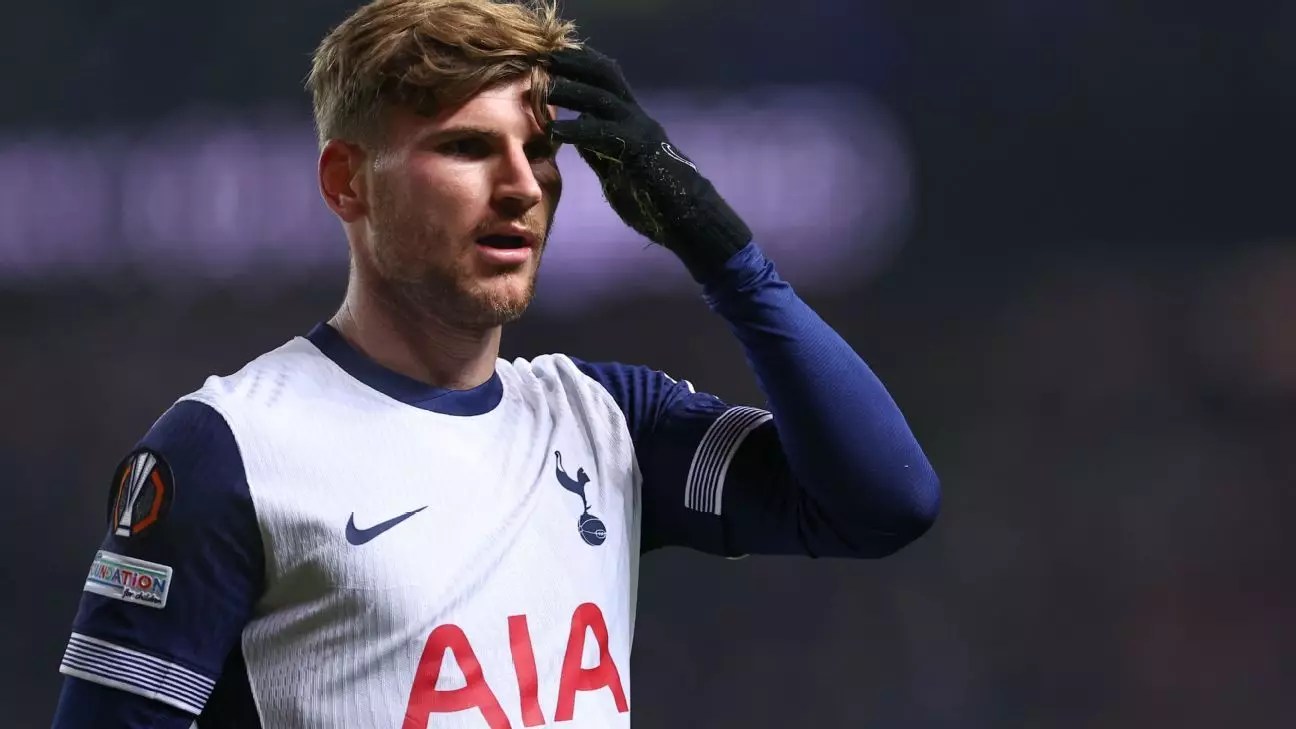The world of football is replete with passionate players and coaches, each vying for success amid the pressures of competition. In such a high-stakes environment, performance evaluation becomes critical. In the realm of Tottenham Hotspur, recent comments from head coach Ange Postecoglou regarding Timo Werner’s performance during a Europa League match epitomize this need for accountability. The context of these remarks is essential to understanding both the predicament Spurs find themselves in and the expectations Postecoglou is setting for his players.
Expectations vs. Reality
Ange Postecoglou’s direct assessment of Timo Werner’s first half against Rangers—labeling it “unacceptable”—reflects a growing frustration that many coaches express when their senior players fail to meet expectations. As Postecoglou rightly pointed out, the squad is already depleted by injuries, leaving fewer options on the pitch. When seasoned internationals like Werner deliver subpar performances, it heightens the burden on younger players, such as 18-year-olds Archie Gray and Lucas Bergvall, to compensate. Here lies the crux of Postecoglou’s frustration; the expectation is that the senior players step up, guiding and elevating the team’s overall performance instead of falling short.
The discrepancy between expectation and reality is jarring. Postecoglou’s remark that he requires everyone to maximize their individual contributions speaks volumes about his leadership philosophy. He isn’t merely reprimanding Werner; he is calling on all senior players to be accountable and deliver when the team is in a vulnerable position. With a mere 15 fit players available and critical positions lacking depth, there’s a palpable urgency that permeates every decision made on and off the field.
The Importance of Collective Responsibility
Postecoglou’s management style emphasizes that football is inherently a collective endeavor. He recently stated he has “no time” for concerns about players’ “bruised egos,” indicating that individual sensitivities must take a backseat to the team’s needs. This is particularly salient in today’s sporting climate, where mental health and individual player welfare are frequently discussed topics. Postecoglou’s stance, however, advocates for a rugged mentality in the face of adversity. Such an approach may resonate well with some players while alienating others who seek emotional support from their coach.
Additionally, his comments underscore the necessity for a balanced team dynamic. In a far-reaching analysis of team performance dynamics, it often becomes evident that a team only excels when there is a palpable sense of collective responsibility. The impression that a few players carry the team while others underperform can breed resentment and destabilize morale. Thus, the call for senior figures like Werner to elevate their level extends beyond mere performance metrics; it sets a precedent for accountability that Postecoglou believes needs to prevail in the squad.
This discourse on performance accountability also highlights the broader challenges facing Tottenham this season. Currently languishing in 11th place in the Premier League, Spurs have struggled with consistency. Their record of just four away victories in 2024 exemplifies the inconsistency troubling the squad. When discussing whether his attacking philosophy is inherently more challenging to execute away from home, Postecoglou countered that changing game plans merely results in treating certain fixtures with a detrimental conservatism. He argued that his intent to win every game should remain intact, irrespective of the venue.
This perspective puts the onus on the players to adapt to varying circumstances instead of waiting for the conditions to align in their favor. While attacking football is often critiqued for its perceived neglect of defensive duties, Postecoglou interprets it as an embodiment of a winning mentality—one that prioritizes initiative over caution.
As Tottenham prepares to face bottom-of-the-table Southampton, the implications of Postecoglou’s previous assessments loom large. A victory could provide a much-needed morale boost, while failure might further strain the fragile confidence within the squad. The stakes are exceedingly high, not just for the players but for Postecoglou himself, who appears to be weaving a narrative of accountability at Spurs.
As he prunes the squad to find players who exhibit commitment and fortitude, his endeavor signifies more than just current performance; it is a quest to restore the club’s identity in difficult times. The question that looms is whether Timo Werner will rise to the challenge or, as Postecoglou might fear, continue to serve as a reminder of what can transpire when expectations are not met. The evolution of this team and its potential to rebound from their current plight will depend intimately on their collective resolve in the face of adversity.


Leave a Reply